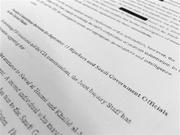- California Assembly OKs highest minimum wage in nation
- S. Korea unveils first graphic cigarette warnings
- US joins with South Korea, Japan in bid to deter North Korea
- LPGA golfer Chun In-gee finally back in action
- S. Korea won’t be top seed in final World Cup qualification round
- US men’s soccer misses 2nd straight Olympics
- US back on track in qualifying with 4-0 win over Guatemala
- High-intensity workout injuries spawn cottage industry
- CDC expands range of Zika mosquitoes into parts of Northeast
- Who knew? ‘The Walking Dead’ is helping families connect
SECRET CHAPTER OF 9/11 INQUIRY RELEASED AFTER 13-YEAR WAIT
WASHINGTON (AP) — Newly declassified pages from a congressional report into 9/11 released Friday have reignited speculation that some of the hijackers had links to Saudis, including government officials – allegations that were never substantiated by later U.S. investigations into the terrorist attacks. 
Congress released the last chapter of the congressional inquiry that has been kept under wraps for more than 13 years, stored in a secure room in the basement of the Capitol. Lawmakers and relatives of victims of the attacks, who believe that Saudi links to the attackers were not thoroughly investigated, campaigned for years to get the pages released.
The lightly redacted document names individuals who helped the hijackers get apartments, open bank accounts and connect with local mosques. Fifteen of the 19 hijackers were Saudi nationals and several were not fluent in English and had little experience living in the West.
Former Florida Sen. Bob Graham, the co-chairman of the congressional inquiry, who pushed hard for the last chapter of the inquiry’s report to be released, believes the hijackers had an extensive Saudi support system while they were in the United States.
The document says Omar al-Bayoumi, a Saudi national who helped two of the hijackers in California, was suspected of being a Saudi intelligence officer. The 9/11 Commission report found him to be an “unlikely candidate for clandestine involvement” with Islamic extremists. The new document says that according to FBI files, al-Bayoumi had “extensive contact with Saudi government establishments in the United States and received financial support from a Saudi company affiliated with the Saudi Ministry of Defense. … That company reportedly had ties to Osama bin Laden and al-Qaida,” which orchestrated the attacks.
The document also points to Osama Bassnan, who lived across the street from two of the hijackers in California. According to an FBI document, Bassnan told another individual that he met the hijackers through al-Bayoumi. Bassnan told an FBI asset that “he did more than al-Bayoumi did for the hijackers.”
The office of the Director of National Intelligence on Friday also released part of a 2005 FBI-CIA memo that said “there is no information to indicate that either (Bayoumi) or (Bassnan) materially supported the hijackers wittingly, were intelligence officers of the Saudi government or provided material support for the 11 September attacks, contrary to media speculation.”
Included in the document was a comment from former FBI Director Robert Mueller. “If I have one preliminary note of caution, it is that at this point there are more questions than answers, and I would caution against jumping to conclusions before we know a lot more,” Mueller said in an Oct. 9, 2002 closed hearing.
Later investigations found no evidence that the Saudi government or senior Saudi officials knowingly supported those who orchestrated the attacks.
Saudi Arabia has urged the release of the chapter since 2002 so the kingdom could respond to any allegations and punish any Saudis who may have been involved in the attacks.
“Since 2002, the 9/11 Commission and several government agencies, including the CIA and the FBI, have investigated the contents of the ’28 Pages’ and have confirmed that neither the Saudi government, nor senior Saudi officials, nor any person acting on behalf of the Saudi government provided any support or encouragement for these attacks,” Abdullah Al-Saud, Saudi Arabia’s ambassador to the United States, said in a statement Friday.
“We hope the release of these pages will clear up, once and for all, any lingering questions or suspicions about Saudi Arabia’s actions, intentions, or long-term friendship with the United States,” he said. “Saudi Arabia is working closely with the United States and other allies to eradicate terrorism and destroy terrorist organizations.”
House intelligence committee Chairman Devin Nunes, R-Calif., said that while he supported the release, “it’s important to note that this section does not put forward vetted conclusions, but rather unverified leads that were later fully investigated by the intelligence community.”
Former President George W. Bush classified the chapter to protect intelligence sources and methods, although he also probably did not want to upset U.S. relations with Saudi Arabia, a close U.S. ally. Two years ago, under pressure from the families of those killed or injured on Sept. 11, and others, President Barack Obama ordered a declassification review of the chapter. Director of National Intelligence James Clapper conducted that declassification review and transmitted the document to Congress, which released the pages online on Friday.
Several investigations into 9/11 followed the congressional inquiry, which released its report – minus the secret chapter – in December 2002. The most well-known investigation was done by the 9/11 Commission, led by former Gov. Tom Kean, R-N.J., and former Rep. Lee Hamilton, D-Ind.
Kean and Hamilton said the 28 pages were based almost entirely on raw, unvetted material that came to the FBI. They said the material was then written up in FBI files as possible leads for further investigation.
They said the commission and its staff spent 18 months investigating “all the leads contained in the 28 pages, and many more.” The commission’s 567-page report, released in July 2004, stated that it found “no evidence that the Saudi government as an institution or senior Saudi officials individually funded” al-Qaida. “This conclusion does not exclude the likelihood that charities with significant Saudi government sponsorship diverted funds to al-Qaida.”











